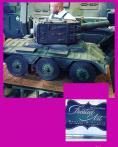The Redemptive Omelet
It was the hour before sundown in the mountains of Northern Italy when Private McCrae was killed instantly by a sniper’s bullet. His broken body lay on a primitive dirt road. For a head shot there was surprisingly little blood.
Several soldiers from McCrae’s company grouped about the fallen soldier. They were all tired and combat worn, yet seemed indifferent to the possibility of another sniper bullet as they stood and stared down at the body of their dead comrade. The terrible finality of the deadening was silently absorbed by the gathered soldiers.
Their company commander, a stocky built, black bearded captain emitted power and enormous physical strength. He held a carbine like it was a toy gun and shook it in impotent rage. His anger at another senseless death galvanized the robotized men in the group who had gathered around the dead soldier. “Bastards…they just killed one of our best men!” He then glanced at his wristwatch and stared at the receding vista of lights that were flashing and gyrating crazily behind the gloomy, steel gray mountain peaks. Night was coming on fast.
“Men,” the CO reminded, “we’ve got a few minutes of light,” exhorting, “so fan out in threes—and kill something.”
McCrae had indeed been a fine soldier. The CO’s demonstrative rage instantly rubbed off on the men. Alert and determined, they began their sorties.
The sweltering sun was fighting a losing battle with the somber, encroaching darkness of the lonely night. The mountaintops were intermittently illuminated by flashes of subdued yellow, gold and red sunlight.
The soldier’s body, so small and lifeless against the magnitude of the mountainous background, lay alone on the shoulder of the road, while the horror of war and inevitable darkness moved over the somber landscape.
Part II
Three soldiers moved up a small, narrow, dusty trail. Bourgette, Arklander and Jim peered with anxious eyes into the gathering dusk.
Crazed antics of the dying sun established a grim setting for the pending incident. A sharp bend in the trail exposed a small meadow; at the center was a large haystack, gray, grim and abandoned from the war. A ray of sunlight illuminated the small enclave, like a spotlight in a theatrical Bourgette caught a furtive flash of gray. He quickly released the Browning Automatic Rifle’s bipods and dropped to the prone, with weapon positioned for deadly, accurate fire. Arklander and Jim followed suit and lay on the ground close by. The B.A.R. man then spoke quietly to his companions, “He’s hidin’ behind that haystack. Jimmie, you move right, Arkie left. I’ll blast the stack and if he bugs out, pick’im off.” The two men nodded, hoping their brother at arms had pegged it correctly.
Jim ran in a crouch to the right, hit the prone, and swallowed hard as he prepared to deal with the one situation he had always dreaded. He had never killed the enemy up close. In over a year of combat he had been a machine gunner, laid in mortars, and fired clip after clip of MI in firefights. The distanced deaths helped him cope.
Arklander and Bourgette had adapted readily to the brutal life of wartime foot soldiers. Each faced death with outward fearlessness as he fought and killed. It was though they had always been in combat. These two hard bitten veterans accorded their “Jimmie” equality and familiarity. The war permeated all and seemed to freeze time itself.
Jim was uneasy that perhaps he was too tender hearted. This had been rough and it seemed inevitable that one day he would squeeze the trigger and the taking of a human life would be his burden and his alone to bear. Jim had often wondered if he could shoot a man who was looking him in the face. If the war continued, he was certain that he too would die.
Bourgette waved slowly, indicating that he was going to fire. Squinting down the barrel, he turned a blast into the haystack. Jim waited, hoping the sniper had been killed.
The gray clad enemy leaped out, hunched over, and scrambled blindly for the wooded area twenty yards away. Panic radiated from him as he made the futile bid. This man was about to become an ultimate loser, and it was hard to picture him as part of the German killing machine. This was no broad shouldered, slim- waist S.S. trooper. He was simply a fear-filled human being who stared crazily in all directions. Disheveled, his gear jangled. Inexplicably, like a man controlled by destiny he stopped abruptly, and with booted feet firmly planted, turned and charged directly at Jim’s position.
The Mountain Infantry rifleman from New York aimed. His heart pounded and his labored breathing caused the image of the hapless enemy’s helmet to bounce around on the front sight blade. A puzzling calmness suddenly settled over him. He held his breath and squeezed the trigger. The shot in the evening silence sounded like a canon. The helmet bobbled and its owner crumpled to the ground. ‘Jimmie’ was thousands of miles from home, in a war he played no part in creating, and had just dealt with his demon of causing another man’s death, face-to-face.
Arklander grinned from his cover behind a large stone. “Nice shot Jimmie. Why’d you get’im in the head? You should have gut shot the bastard…I’ll bet he’s the son-ufa-bitch that killed McCrae!”
Jim nodded wearily. Bourgette crawled over to him. Arkie stayed where he was.
“He’s dead, Jimmie. I could tell the way he bounced. Hell, man, you killed’im… you can roll’em. We’ll cover yuh.”
Jim successfully hid the bewildering feelings of calmness that he felt during the shot, the split second and sadistic exultation of the kill, the sadness at its futility, and self justification that men in combat…kill.
The reaction, then release of emotions, set in. Jim began to feel numb, yet, felt an almost insane desire to be polite and considerate, to help old ladies cross the street, to be kind to old men, shake hands, hold chairs, clutch coats and observe all the protocol of polite social behavior.
This emotion was indeed alien to Jim, who while not actually crude or antisocial, believed in the old Hebrew adage “To be too sweet is to be ate up.”
Jim replied, “Sure, I’ll get’im now,” and crawled toward the inert body.
Arklander and Bourgette watched. “He’s the best. He ain’t scared of nothin’,” Arkie declared. Bourgette nodded in approval.
In reality, Jim was so tired, upset, and bewildered that he didn’t give a damn if he lived or died.
In the gathering darkness, the flashing lights from the mountain sunset had settled into a silent, mysterious gloom. Jim smelled him first. German soldiers were fastidious and some said the peculiar sick-sweet odor was the hair oil or their soap; the foe’s toilet article kits were jumbles of vials, tubes, and soaps.
As Jim high-crawled toward the body, he saw that it was short and dumpy, like an over stuffed toy soldier. The fat assed bloused trousers stuffed into boots, even in death, gave him a comic-tragic appearance. Jim quickly rolled him over and stared into the unseeing eyes of the dead. His fat, clean-shaven face matched the squat, fat body. His cheeks were red, like he was blushing. His eyes were blue. At least fifty, he was too old to be a soldier. Jim thought the enemy was scraping the bottom of the barrel.
Unbroken and laying beside him in the dirt was the badge of the sniper, heavy bifocal glasses. The procedure was simple, kill some Yanks, ditch the gun, slip on the glasses, and then surrender. Who could believe the wearer of such heavy lenses was a sniper?
Jim felt the doubt bludgeon him. Perhaps this Jerry was nothing but a lost and scared rear echelon Charlie? He pushed the thought aside, groped through the unbuttoned jacket, and removed a wallet stuffed with Italian lire. There were also photos of the chubby faced deceased and his presumable family and friends.
This man was a father or even a grandfather. One picture intrigued Jim, a photo of a German grave, in a tight, terse, military cemetery; headstone complete with Iron Cross. He stuffed the picture and the money into his pockets and crawled back to the waiting soldiers.
The three men rejoined the company that was forming up. Darkness was now a dim, gloomy film, though not more than ten minutes had elapsed. The CO asked, “Was that your fire?”
“Yes, sir,” Arkie replied, “Jim killed a Kraut—and with a nice shot.”
“Great!” came the reply, “But we gotta reach Polio. It’s about two miles down the road.” The burly captain summoned the first sergeant, “Take some men and bag n’ tag McCrae. Leave the goddamned Kraut out there.”
The company moved out to the crunch of booted feet and the occasional rattling of infantry gear.
Part III
Jim drank a lot of wine that night. The café was very old, small, dimly lit, and crowded. Most of the company was there and still armed to the teeth. The loud raucous conversation was incessant. Guffaws of laughter rang out continuously. No one mentioned the killing, least of all Arkie and Bourgette. They had already forgotten it. Jim remembered and he could not get tight. He grinned ironically and felt like Judas and Benedict Arnold rolled into one. Bourgette glanced over from another table and raised his glass to salute.
Just then the owner of the café, an elderly Italian woman, walked by the table and one of Jim’s friends blurted, “Christ, I’m hungry…whats tuh eat?”
“In broken English, she replied, “We av leetle lef but eggs.” Eggs were about all the Italians could still offer for public consumption.
Jim began to feel the wine. “How much for an egg, Madam?”
As she searched his face, she saw the madness, the insane joy, and a very young American who had done and seen too much for his years.
“Egg…one dollar.”
Jim laughed, “I want eighty five eggs for a “La Grande Omelet.”
He thought, “My buddies here are the best soldiers in the world. In this war you have to laugh a lot, like it rough, and make it.” He pondered how many of these men would not ‘make it.’
Presently, the cook appeared with a huge, smooth, rich, and creamy omelet. It smelled delicious.
Jim motioned for her to place the enormous platter on the bar, and shouted, “You’re all invited to help eat this omelet…courtesy of Arkie, Bourgette, and me!”
The omelet was destroyed as the men slashed the feast with battle knives and bayonets. The men ate with hearty appetites. Again the wine flowed and joy reigned. The meal had hit the spot and Jim felt a certain peace. The killing seemed remote and far away.
As soldiers departed the café for their shelters, many approached Jim and thanked him for the omelet treat.
The night was quiet, and a godsend cool and sweet smelling breeze replaced the rumble of artillery and crackle of small arms fire.
Jim lay in his sack. He muttered to himself, “What a clown. You could’ve wing’ed ‘im and taken’im prisoner, but you yuh took’im out. He was an old granddad that needed glasses. Christ, when will it end?”
Jim fell into a troubled sleep, and dreamed that Bourgette and Arkie grinned and gave him a mock salute.
by
John A. Powers
Box 94
Davenport Center, NY 13751



